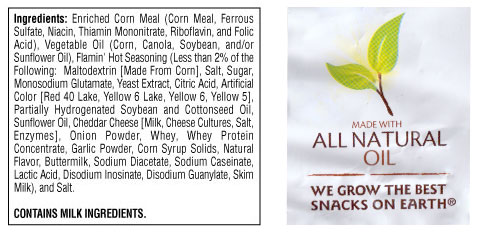
Written By: Sofia Layarda, MPH
Title: Master of Public Health
Alumni: University of California, Berkeley
Last Updated on:

The labels practically shout out from every shelf: “made from natural ingredients,” or, in one of our more recent finds, made with “all-natural oil.” Is there any merit to something that is labeled natural on the store shelves?

Table of Contents
First and foremost, the term “natural” is not regulated. Therefore, the term on its own is meaningless and doesn’t confer any automatic health or nutritional benefit. Our example above with the “all-natural oil” was actually a bag of Cheetos with an ingredient list 14 lines long. Made with natural oil? Yes – it says “vegetable oil (corn, canola, soybean, and/or sunflower oil).” But the same bag also contains partially hydrogenated oils, as well as Red 40 lake, Yellow 6 lake, Yellow 6, and Yellow 5 in the seasoning mix. There’s nothing natural about these!

Recently, Kashi cereal buyers were up in arms over the finding that some Kashi breakfast cereal products contain genetically modified ingredients despite being marketed as natural. Again, this is another example of fancy but meaningless “natural” marketing. In all fairness, Kashi never marketed themselves as “non-GMO” or “organic.” They only focus on being “natural.” This Kashi episode really exposed a big loophole in our labeling regulations: What’s natural? Should we impose restrictions on when and how companies can market a “natural” claim?
We also discussed nitrite-free ham, which is sometimes marketed as natural ham. While the producers claim not to use any sodium nitrite in the making of the ham, they use celery juice extract or celery powder as a substitute, which contains high amounts of naturally occurring nitrates. Should high-sodium processed luncheon ham, cured using processed celery powder, be allowed to be called “natural ham”? We don’t think so, and it’s time for us to advocate that our labeling agencies regulate the “natural” claim!
Food that comes pre-packaged and can sit for a long while without spoiling requires a certain amount of processing to have such an extended shelf life. However, there is no need to despair; natural snacks that are office-drawer friendly do exist. Think of dried or freeze-dried fruits or vegetables, nuts and seeds, or dry roasted seaweed.
Alumni: University of California, Berkeley – Sofia believes in bringing back fun and pleasure into everyday eating. She loves cooking, and is constantly experimenting with ingredients, creating recipes and trying them out on family and friends. Her latest interest lies in finding realistic and practical ways of environmentally-friendly food/eating habits.
grocery aisle, healthy snacks, nutritional labels